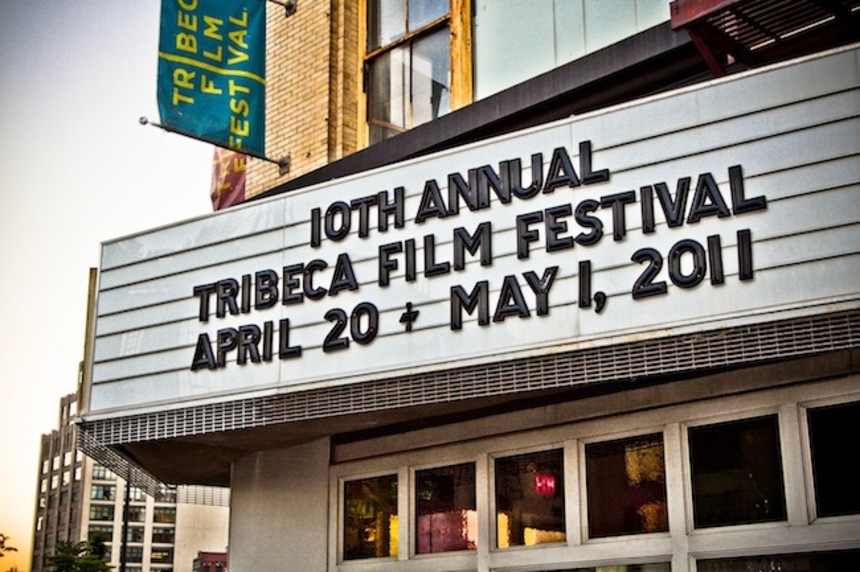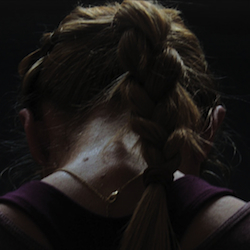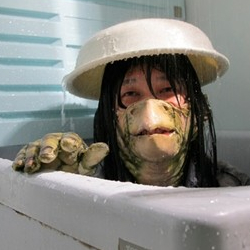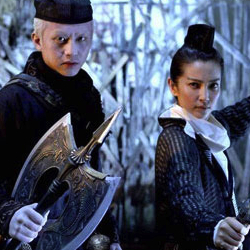Tribeca 2011: Team ScreenAnarchy Wraps Up

Peter Gutierrez: While I focused more on Tribeca's genre films (as one might expect), I was really pleasantly surprised by the Icelandic documentary Gnarr -- it was highly engaging and deceptively deep from start to finish. Some might fault it for being a "politics lite"-style doc, but in this case that's the point: Jón Gnarr was a career comedian who decided to run for mayor of Reykjavik and actually won. But if you dismiss him as a goofball, and therefore Gaukur Úlfarsson's film as a chronicle of a goofball, you're basically making the same mistake that his political opponents did. Really hope this reaches a wide audience at some point. I don't have similar concerns about the other doc I was so impressed with--The Swell Season (Full Review).
Aside from Gnarr, the other film that had me laughing hard consistently was John MichaelMcDonagh's The Guard, which gets a July theatrical release in the U.S. Yes, it's a fish-out-of-water thriller-comedy, but it's self-aware enough that it doesn't get bogged down in cliches. Instead, it's an offbeat character piece with a priceless Brendan Gleeson at its center. To me, The Guard is the perfect summer movie: smart, a little naughty, full of energy, great to look at, and funny throughout. You can keep your overblown studio action pics. I just hope The Guard doesn't get lost in the summer onslaught of popcorn flicks. What about you? Anything that really stood out?
Ben Umstead: I found myself enjoying well over half of what I saw this year, and one movie I did see but did not do a full review on is Lisa Aschan's She Monkeys, which won for Best Narrative Feature at the fest. In the past Aschan made some short form documentaries in Sweden and Denmark, and while still in film school got attention for a series of fictional advertisements for spiked tampons called "Fuck The Rapist". This kind of transgressive attitude carries over to her first feature, but under a particular brand of naturalism.
 Finding some success already in Scandinavia, She Monkeys has been
compared to Lukas Moodysson's Fucking Åmål (aka Show Me Love), because both
films deal with the budding relationship and sexuality of two
teenage girls, but outside of both films being Swedish and their subjects
being teenagers I would not take the comparison any further. She
Monkeys operates much closer to the French film Water Lilies in that it
centers the girls' relationship around a particular sport: in Water
Lilies it was synchronized swimming, in She Monekeys it is equestrian
acrobatics, a world we don't see too often on film, and a place to
set-up an instant rivalry between newcomer Emma (Mathilda Paradeiser)
and would-be-leader Cassandra (Linda Molin). Water Lilies is very
lyrical and dreamy, and while She Monkeys has a certain ethereal
current to it as well, it is a very cold, calculating picture with a
dark, insidious sense of humor.
Finding some success already in Scandinavia, She Monkeys has been
compared to Lukas Moodysson's Fucking Åmål (aka Show Me Love), because both
films deal with the budding relationship and sexuality of two
teenage girls, but outside of both films being Swedish and their subjects
being teenagers I would not take the comparison any further. She
Monkeys operates much closer to the French film Water Lilies in that it
centers the girls' relationship around a particular sport: in Water
Lilies it was synchronized swimming, in She Monekeys it is equestrian
acrobatics, a world we don't see too often on film, and a place to
set-up an instant rivalry between newcomer Emma (Mathilda Paradeiser)
and would-be-leader Cassandra (Linda Molin). Water Lilies is very
lyrical and dreamy, and while She Monkeys has a certain ethereal
current to it as well, it is a very cold, calculating picture with a
dark, insidious sense of humor. A parallel plot with Emma's 8 year-old sister, Sara deals with the budding sexuality of a child, which when dealt with on film can be very taboo, and per Todd Solondz, very weird. Aschan and young actor Isabella Lindquist do something quite different - while things may be going in a slightly uncomfortable, pre-mature direction, it is authentic to a T. To acknowledge pre-pubescent sexuality in its own right is admirable of Aschan because she doesn't undermine it from an adult's perspective -- it is not condescending to children in the least. And it is this naturalism, this hands-on/hands-off approach in all three performances that grounds the picture. Aschan's ability to pull you closer while keeping you at a distance, and vice versa, is very impressive. It is bold filmmaking without being bombastic. Something both fresh and classical in form and aesthetic. While I'm still somewhat hesitant to call She Monkeys my favorite film of the fest, it is definitely the one I want to see again as soon as possible.
And on a completely different note, I must mention the Israeli-horror film, Rabies, from directors, Aharon Keshales and Navot Papushado. Your full review, Peter convinced me to seek this one out and I'm quite glad I did. I am in no way a fan of slasher flicks, or rather traditional slasher flicks, so this was a rather nice surprise. While a lot of folks are saying how funny the picture is, I was most impressed how the filmmakers took the material and played it as straight as they possibly could without loosing that comedic or campy edge when they needed it. The metaphorical resonance of the title had me laughing as much as it had me itching to start a conversation on the human condition. Peter, you called it your "favorite horror film of the year thus far" -- Does that still stand?
Peter: Oh, definitely. If I were on the ball, I'd even try to interview one of the directors--maybe I still will at some point. It's rare that a horror flick fires on all cylinders like Rabies does. The narrative grips you just on the level of all the twists and turns, the horror hits you--hard--in the gut, and then afterward there's plenty to think about, a kind of intellectual aftertaste.
 And for me
it was definitely one of the high points of the fest's "Cinemania"
strand. To me this is what a major fest in a big city needs to do in
terms of genre programming. Bring in crowd-pleasers from places like
Israel that aren't really on the genre-hound's map, or even just have
worthwhile films like Troll Hunter
on hand for
the New York moviegoers who don't attend the international fests where
it first gained buzz. I guess another attempt in this vein is Saint (aka
Sint), in that it's a popcorn flick that should, ostensibly, transcend
borders due to its slasher tropes and the quasi-awareness of St. Nick.
That is, like Troll Hunter, the
North American audience has a sense of its subject matter, but the film
is still deeply rooted in its particular culture, in this case that of
The Netherlands. The problem for me is that Saint never
did much in terms of going beyond those slasher tropes. And that's too
bad because I found both of its period prologues compelling and
original. There are also a couple of nasty moments that really work on a
visceral level, but in the end everything plays out in a fairly
formulaic way.
And for me
it was definitely one of the high points of the fest's "Cinemania"
strand. To me this is what a major fest in a big city needs to do in
terms of genre programming. Bring in crowd-pleasers from places like
Israel that aren't really on the genre-hound's map, or even just have
worthwhile films like Troll Hunter
on hand for
the New York moviegoers who don't attend the international fests where
it first gained buzz. I guess another attempt in this vein is Saint (aka
Sint), in that it's a popcorn flick that should, ostensibly, transcend
borders due to its slasher tropes and the quasi-awareness of St. Nick.
That is, like Troll Hunter, the
North American audience has a sense of its subject matter, but the film
is still deeply rooted in its particular culture, in this case that of
The Netherlands. The problem for me is that Saint never
did much in terms of going beyond those slasher tropes. And that's too
bad because I found both of its period prologues compelling and
original. There are also a couple of nasty moments that really work on a
visceral level, but in the end everything plays out in a fairly
formulaic way.Ben: I'm glad you mentioned Tribeca's effort in getting an eclectic bunch of genre films in their line-up this year. They are not a festival known for the more imaginative/off-beat fare, but it seems to me they really hit a couple of home runs this time out. I hope it's something they keep up with, and expand upon in future years.
And, I tried my darnedest to catch Saint, but was pretty much running on fumes once I hit my 13th feature (which is a new record for me). I'm sure I'll see it down the line since IFC midnight has picked it up for release stateside, but it wasn't really on my radar to begin with, so I'm not too disappointed .
The genre film at the fest that I was quite looking forward to was Panos Cosmatos' Beyond The Black Rainbow (full review). The trailer lulled me in with its neon-bubblegum visuals and electronic score. The full film didn't disappoint on any level really. I was expecting an ambiguous, slightly oblique and otherworldly trip, and that is exactly what Cosmatos gave me. For its running time I was totally engrossed in the ever expanding, increasingly strange yet familiar world he was constructing. I can see plenty of people having issues with this film, namely its slow pace, open-endedness and broad thematic structuring. For me it fits snugly between Kubrick and Tarkovksy with a sprinkling of b-movie madness and avant-garde brashness.
Peter: And let's not forget that at times the villain/main character (he's really both) looks like Christian Bale playing Mr. Spock--so that's genre cred right there.
But seriously... although I didn't see Neon Flesh, the rest of the Cinemania lineup was a startling tale of polar opposites. Yes, I really think Tribeca is to be commended for including oddball and/or challenging films such as Underwater Love and Beyond the Black Rainbow. And shame on all those critics who walked out of the pre-fest screening of the latter after less than a half an hour--not saying one had to like the film, but you're a grownup and there was plenty to pay attention to aesthetically even if you didn't like the pace of the narrative.
 Underwater Love--another
risky, idiosyncratic choice just by virtue of including a pinku in the
lineup. Would it have been selected without the Christopher Doyle
pedigree? Maybe not. It also helps that the fantasy, romcom and musical
elements all outweighed the sex, which was actually present in smaller
proportions than I'm used to with this genre. All in all, Shinji Imaoka
has to be commended for crafting something out of these elements that's
not only cohesive, but, as you pointed out, downright refreshing. Now,
if my interview with him and Doyle can ever get finished and see the
light of day...
Underwater Love--another
risky, idiosyncratic choice just by virtue of including a pinku in the
lineup. Would it have been selected without the Christopher Doyle
pedigree? Maybe not. It also helps that the fantasy, romcom and musical
elements all outweighed the sex, which was actually present in smaller
proportions than I'm used to with this genre. All in all, Shinji Imaoka
has to be commended for crafting something out of these elements that's
not only cohesive, but, as you pointed out, downright refreshing. Now,
if my interview with him and Doyle can ever get finished and see the
light of day...Ben: I'm sure we'll get that together (insert hearty and hopeful laugh here). And Underwater Love (Full Review) was refreshing for me on several levels. One amusing anecdote being that the press screening I attended had a deluge of twenty-somethings, whereas the previous screenings I was present for were made up of myself and folks well over 50. But unlike your experience with Beyond The Black Rainbow, no one walked out, which I was so pleased with. Despite it being a risk, Underwater Love has such an infectious spirit and whimsy to it, you'd have to be quite the curmudgeon to turn your nose up to this one. While it could be seen as border line bad (IE quickly produced with questionable plotting and effects), it is in no way in bad-taste. It is just too cute for that.
Peter: Agreed... but then there was the other side of the spectrum. Oh, and in the interest of full disclosure (I should have said this when I was being positive, actually), I sometimes write for TribecaFilm. But that won't stop me from saying that films such as Grave Encounters and The Bleeding House were real disappointments. I admire the fact that the fest tries to succeed on the genre front without leveraging big name directors (John Carpenter! Takashi Miike!), and I welcomed the kind of offbeat choices mentioned earlier, but with these two titles I really had to shake my head. Were they included because Tribeca Films is distributing them, and so we'll be faced with this scenario again in future years? Certainly these are the kind of modest, thoughtful films that deserve to be screened at fests--genre fests, regional fests, and so on. But to spotlight them in what's supposed to be showcase of the best indie stuff out there--well, it arguably does a disservice to the horror genre as a whole.
Grave Encounters starts promisingly enough, with a sharp parody of the current ghost-hunting TV shows, and certainly the premise would seem tailor-made for the "found footage" treatment. Now, a confession--I actually find these foot footage films to be unnerving in a lot of cases: I was downright terrified by parts of Blair Witch, found [REC] effective, was scared by certain scenes in Paranormal Activity although I found others too silly for words, and even liked The Last Exorcism up until the ending. But Grave Encounters didn't scare me at all, not even for a second. It telegraphs a couple of its scares, and many of the other attempts are either too over-the-top in terms of imagery or are overly familiar. There's some great stuff involving a distortion of space and time and the disorientation it causes the characters--who are trapped in an abandoned asylum--but this is about a five-minute stretch in the middle of a 90-minute movie. Grave Encounters is now on VOD, I think, which is a good venue for it because I could see someone watching it alone at 2:00 am somewhere and being creeped out. It just didn't do anything for me, though.
The Bleeding House features one of my favorite themes--the collision of two forms of evil, but its treatment here made me wish it had been handled in a different medium. Novel? Stage play? Maybe the latter since there is an overall staginess and talkiness to the production. There's also a strained literary quality to it that becomes more and more off-putting because the film doesn't deliver on the visceral elements in the way it seems to think it does. Instead, it serves up a couple of cliches at key moments that really undermine the positive things it tries to do. In the end, then, The Bleeding House doesn't work as a pulpy, low-budget disturbance or as a highbrow, lyrical character study or ensemble piece, which is what it often seems to aspire to. Unfortunately, this neither-here-nor-there quality results in a lukewarm middlebrow effort that sags until it turns to mush before your eyes.
Ben: On one hand I'm quite glad I dodged the bullet on poor genre films (and also sorry you had to get the brunt of those), but I wasn't lacking in seeing some middling to weak films of my own.
The social justice documentary Give Up Tomorrow is an earnest effort, its subject matter of a wrongfully accused man on death row in the Philippines is harrowing to be sure, but as a film there isn't much to admire. Director Michael Collins is well meaning, and he is thorough in his investigation of corrupt federal, judicial and police forces, but the way it moves from point A to B isn't all that engaging, and while there is an abundance of television news footage and even police tapes, none of it is used in a way that draws Give Up Tomorrow away from being a very standard, and now very stagnant kind of documentary in its formula. There was one brief scene taken from a camera smuggled into the overcrowded prison which I found to be quite disheartening and eye-opening but that's about it. So It doesn't suffer from a case of "talking head-itus" but it shows some heavy symptoms nonetheless. I guess I'm in the minority on this one though since it just won the audience award.
My Last Round from Chile is one of those slice-of-life dramas you find at a dozen or more festivals. It tries so hard to be what it thinks is interesting and original. Here's the premise: A homosexual boxer and his new boyfriend move to the big city when they find out the boxer has a brain condition that could kill him if he enters the ring again. So it's time to start anew, but the ring still beckons... It is the kind of film I don't want to say anything about because anything I could muster would just sound like complaining... and... oh, well. Wait...
Pretty much the same goes for the Serbian pseudo-musical, White White World. It is so utterly joyless, but in a way that is too obvious, too hammering. It plods along in the muddy waters of Greek tragedies past, with a Serbian folk quality that may be interesting on an anthropological level, but that is about it. It is a well produced film that I'm sure has an audience out there. I'm just not occupying a seat in that theater (though I did see it in a theater).
Out of the seven feature debuts I saw at the fest, Magic Valley is the one that held some promise on initial inspection but fell quite flat for me on viewing. I always want to give a first time director like Jaffe Zinn the benefit of the doubt; I understand the uphill battle that one must face when making a film, especially their first. Unfortunately Magic Valley is insipidly hollow, and overreaching in its subject matter and themes: it side steps some basic logic just to make a point hit home in what it thinks is a subtle manner; it is a film with just too many characters and "connecting" story threads that made me think "small town Babel", which is never a good thing. It is certainly a well shot film, composed in a lovely widescreen that complements the pastoral landscapes of Idaho, but when those images are just pretty pictures and nothing more... Sigh. Calling it Gus Van Sant-lite may be too much of a compliment.
But now look at me, quite the curmudgeon. If we may, I'd like to end on a more positive note.
Peter: Well, TFF 2011 was pretty positive for me.
Even films I wasn't crazy about, like The
 Assault (Full Review), had things to recommend them. And then there was Detective Dee and the Mystery of the Phantom Flame,
which I felt was spectacular and memorable for several reasons. Nice
acting, terrific action, and an overall sense of the fantastic that's
fun to experience on a big screen with a full house. I feel the only
major strike against it is the lame CGI on the panoramic Red Cliff-style
shots, and the even lamer CGI that's used for the (fighting) deer--it
seemed like a weird homage to the final scene in that Christian Alvart movie Antibodies, in which fake-looking deer also feature so prominently.
Assault (Full Review), had things to recommend them. And then there was Detective Dee and the Mystery of the Phantom Flame,
which I felt was spectacular and memorable for several reasons. Nice
acting, terrific action, and an overall sense of the fantastic that's
fun to experience on a big screen with a full house. I feel the only
major strike against it is the lame CGI on the panoramic Red Cliff-style
shots, and the even lamer CGI that's used for the (fighting) deer--it
seemed like a weird homage to the final scene in that Christian Alvart movie Antibodies, in which fake-looking deer also feature so prominently. Let the Bullets Fly was fun, although I imagine it's a film that can divide audiences. Its opening is rousing, and when it wants to go into action mode, it succeeds. But for most of its running time it's a highly farcical black comedy, with its off-handed violence and multi-layered plots and conspiracies. Chow Yun-Fat does some great comedic stuff--I just wish he had been allowed to be a bit more charismatic as well, especially as his role seemed to demand it to a degree. Still, that's not the movie that Jiang Wen chose to make, and I respect that--he's an interesting filmmaker, and I could easily picture myself seeing Let the Bullets Fly again to catch things I missed. On the surface, it closely resembles a Leone spaghetti Western, but there's other stuff going on, too, and I imagine that a knowledge of Chinese language and history would only enhance an audience's experience. That is, I feel that for some reason some stuff gets lost in translation for a Western viewer... still, even what comes across is quite intriguing.
As for the festival as a whole, it's so sprawling, I just wish I'd seen more titles. I look forward to catching up with several of those that I missed, including some that you mention, in the months to come.
Ben: Last year's TFF was something of a bubble experience for me, in that I saw most of the films at pre-fest press screenings, and had next to no idea of what the actual festival was like. This year was completely different in that I only saw a handful of those, and was really out on the floor at the actual fest and its multiple venues and even got to attend some parties, which is always a weird experience to say the least. But also delightful. Things were fairly low-key, but there was definitely an excitement in the air. The crowds for last minute rush tickets alone were impressive.
From their diverse short film programs to the off-beat Norwegian comedy Turn Me On, Goddammit! (Full Review) I must say I was mightily impressed by the fest's selection. Can't say enough good things about She Monkeys, and I'm still very much in love with Steve Coogan and Rob Brydon in Michael Winterbottom's The Trip (Full Review). And even though it takes a few stumbles along the way, Agnes Merlet's Hideways (Full Review) is of an imagination which I think is quite rare, so props to Tribeca for taking a chance on that one. I Just hope it finds a good home and a wider audience.
And, I suppose, that's about it. Thanks for doing this with me, Peter. It was an absolute pleasure to have someone along for the ride this time out. And thanks to our readers near and far. Very much looking forward to next year!

Do you feel this content is inappropriate or infringes upon your rights? Click here to report it, or see our DMCA policy.






